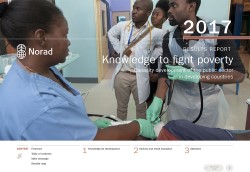Results report 2017: Knowledge to fight poverty
Om publikasjonen
- Utgitt: mars 2018
- Serie: --
- Type: Resultatrapport
- Utført av: Norad
- Bestilt av: --
- Land:
- Tema: Kapasitetsutvikling
- Antall sider: 126
- Serienummer: --
- ISBN: 978-82-7548-966-9
- ISSN: --

Capacity development of the public sector in developing countries is one of the most important contributions that Norway can make in the fight to eradicate global poverty by 2030.
Capacity development is a matter of helping governments in developing countries to manage their natural resources in the best interests of their people, as Norway has done successfully with petroleum, fisheries and hydropower. It is about helping to establish legislation and judicial systems that endure, irrespective of who wins the next election, as well as fair systems of taxation and functioning national audits. It also concerns helping countries to build systems that enable them to use their revenues to provide health services and education to their populations.
Capacity development of the public sector has long been a central aspect of Norwegian development cooperation with developing countries. This year’s results report summarises many of the experiences gained, and provides 22 specific examples of the results of these efforts. Much has gone well, some things less well. We need to learn from both.
For example, Norway has helped to bring Mozambique closer to its objective of national electrification. In the early 1980s, while the civil war still raged, the Norwegian Water Resources and Energy Directorate (NVE) instituted a twinning arrangement with the energy authorities in Mozambique. When the civil war ended in 1992, the power grid covered 15 districts. It now covers 147 of the country’s 154 districts. This cooperation has helped in the training of more than eight hundred employees in various state institutions in Mozambique. That is what capacity development is all about.
Our experience is that it may take a long time before we see the results of cooperation on capacity development. The best results are achieved when the cooperation is based on knowledge and respect for local conditions. Without an understanding of the power
relations, the culture and the traditions, it is extremely difficult to achieve lasting results. It is one thing to know what works in Norway, but quite another to have the wisdom to enable this to work in poor countries on the other side of the globe.
Sharing of knowledge and experience will be ever more important in the years to come. The large disbursements are increasingly channelled through international funds and multilateral organisations. This makes technical cooperation even more essential in the direct cooperation between Norway and the developing countries.
If the Sustainable Development Goals are to be achieved, every country must have access to adequate knowledge, and the capacity to use that knowledge in a prudent manner. Norway possesses considerable knowledge and experience from public management and statebuilding, areas in which advice is requested by developing countries. And we have the will, the capacity and the funding needed to participate in long-term cooperation with countries that request so. This knowledge bank is one of the most important contributions that Norway can make in the effort to ensure that poor countries also achieve the Sustainable Development Goals in the twelve years remaining until 2030.
JON LOMØY
Director General
